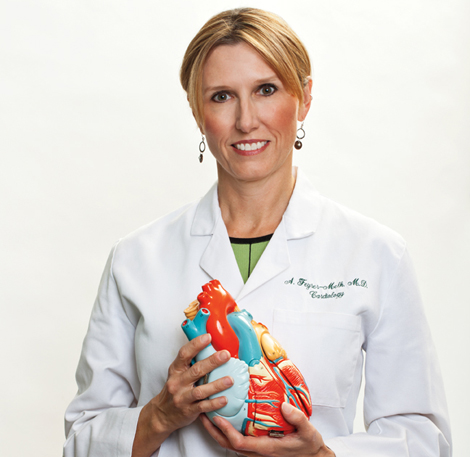Heart of Arizona Optimal Cardiac Care shows patients that they should expect more when it comes to testing and treating their ticker.

Through her year-old Scottsdale practice, Heart of Arizona Optimal Cardiac Care, Dr. Anne-Marie Feyrer-Melk has been helping to save lives via her revolutionary model of concierge cardiac care. One of the many ways she is distinguishing her practice in the realm of heart health is by the risk-determining tests she conducts on her patients, many of which are beyond standard-of-care expectations. “We apply different principals of testing that most patients have never had done before,” Dr. Feyrer-Melk says.
Carotid Intima-Media Thickness (CIMT) Scan “This is referred to as the mammogram of cardiovascular disease because it is safe, reliable and it is an independent predictor of heart attack and stroke,” Dr. Feyrer-Melk says. Unlike an EKG or echocardiogram, a CIMT scan can determine a patient’s cardiovascular age and the thickness of their arteries. This helps in capturing patients before plaque forms or calcium builds up.
Inflammatory Markers Every three months, inflammatory markers—which can cause artery-thickening—are checked in Heart of Arizona Optimal Cardiac Care patients via their blood and urine. “I routinely measure [these markers] on patients to determine if their arteries are hot or cold, warm or cool,” she says. “[I then] apply treatments to get their arteries as cool as possible.”

Genetic Tests “There are genetic tests that are not considered to be standard-of-care that are very helpful in managing patients,” Dr. Feyrer-Melk says. Prior to even seeing a patient, the doctor may order genetic tests to find answers to very pressing concerns: Is a patient going to respond to a statin drug? Are they susceptible to the heart attack protein? What is their lifetime risk of having a belly aneurism or diabetes? “You can’t change these genetic factors, but you can modify your lifestyle and behaviors and that is where the value comes in,” she says.
Oral Systemic Connection “We do testing to specifically address an area of research that is blossoming in cardiology: the oral systemic connection,” Dr. Feyrer-Melk says. “It relates infection in the mouth or different bacteria in the mouth with cardiovascular disease.” For example, if a patient has periodontal disease, they are at an almost four-fold increased risk of having a heart attack and are twice as likely to have a stroke. In this form of testing (which can include a brief salivary test, cheek-swab and/or tooth-scrape), Dr. Feyrer-Melk seeks out 11 particular pathogens that can increase cardiovascular risk and, if present, will arrange a course of treatment. In order to do so, the doctor works closely with a patient’s dentist; Dr. Feyrer-Melk has even trained five local dental offices in the oral systemic connection.
Even though the testing is important in determining crucial risk factors, Dr. Feyrer-Melk’s real work begins once the results are in. “The most important thing to me is not the unique types of tests we do, but how we connect the dots once we have those test results.”
TO LEARN MORE
Heart of Arizona Optimal Cardiac Care www.heartofarizona.com.
Dr. Anne-Marie Feyrer-Melk